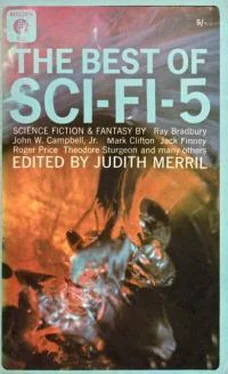The Best of Sci-Fi-5
Здесь есть возможность читать онлайн «The Best of Sci-Fi-5» весь текст электронной книги совершенно бесплатно (целиком полную версию без сокращений). В некоторых случаях можно слушать аудио, скачать через торрент в формате fb2 и присутствует краткое содержание. Год выпуска: 1966, Издательство: Mayflower-Dell, Жанр: Фантастика и фэнтези, на английском языке. Описание произведения, (предисловие) а так же отзывы посетителей доступны на портале библиотеки ЛибКат.
- Название:The Best of Sci-Fi-5
- Автор:
- Издательство:Mayflower-Dell
- Жанр:
- Год:1966
- ISBN:нет данных
- Рейтинг книги:3 / 5. Голосов: 1
-
Избранное:Добавить в избранное
- Отзывы:
-
Ваша оценка:
- 60
- 1
- 2
- 3
- 4
- 5
The Best of Sci-Fi-5: краткое содержание, описание и аннотация
Предлагаем к чтению аннотацию, описание, краткое содержание или предисловие (зависит от того, что написал сам автор книги «The Best of Sci-Fi-5»). Если вы не нашли необходимую информацию о книге — напишите в комментариях, мы постараемся отыскать её.
The Best of Sci-Fi-5 — читать онлайн бесплатно полную книгу (весь текст) целиком
Ниже представлен текст книги, разбитый по страницам. Система сохранения места последней прочитанной страницы, позволяет с удобством читать онлайн бесплатно книгу «The Best of Sci-Fi-5», без необходимости каждый раз заново искать на чём Вы остановились. Поставьте закладку, и сможете в любой момент перейти на страницу, на которой закончили чтение.
Интервал:
Закладка:
But those things didn’t matter now. Without a parachute, he had flung himself from the plane toward the earth below, and his only thought was his loathing, his repugnance, for that too, too solid ground beneath.
He didn’t hate it. That would be deadly, for hate implies as much attraction as love—the attraction of destruction. Fear, too, was out of the question; there must be no such relationship as that between the threatened and the threatener. Only loathing could save him. The earth beneath was utterly repulsive to him.
And he slowed.
His mind would not accept contact with the ground, and his body was forced to follow suit. He slowed.
Minutes later, he was drifting fifty feet above the surface, his altitude held steady by the emotional force of his mind. Not until then did he release the big suitcase he had been holding. He heard it thump as it hit, breaking open and scattering clothing around it.
In the distance, he could hear the faint moan of a siren. The Chinese radar had picked up two falling objects. And they would find two: one door and one suitcase, both of which could be accounted for by the “accident.” They would know that no parachute had opened; hence, if they found no body, they would be certain that no human being could have dropped from the plane.
The only thing remaining now was to get into the city itself. In the darkness, it was a little difficult to tell exactly where he was, but the lights of Peiping weren’t far away, and a breeze was carrying him toward it. He wanted to be in just the right place before he set foot on the ground.
By morning, he would be just another one of the city’s millions.
Morning came three hours later. The sun came up quietly, as if its sole purpose in life were to make a liar out of Kipling. The venerable old Chinese gentleman who strolled quietly down Dragon Street looked as though he were merely out for a placid walk for his morning constitutional. His clothing was that of a middle-class office worker, but his dignified manner, his wrinkled brown face, his calm brown eyes, and his white hair brought respectful looks from the other passers-by on the Street of the Dragon. Not even the thirty-five years of Communism, which had transformed agrarian China into an industrial and technological nation that ranked with the best, had destroyed the ancient Chinese respect for age.
That respect was what Spencer Candron relied on to help him get his job done. Obvious wealth would have given him respect, too, as would the trappings of power; he could have posed as an Honorable Director or a People’s Advocate. But that would have brought unwelcome attention as well as respect. His disguise would never stand up under careful examination, and trying to pass himself off as an important citizen might bring on just such an examination. But an old man had both respect and anonymity.
Candron had no difficulty in playing the part. he had known many elderly chinese, and he understood them well. even the emotional control of the oriental was simple to simulate; Candron knew what “emotional control” really meant.
You don’t control an automobile by throwing the transmission out of gear and letting the engine run wild. Suppressing an emotion is not controlling it, in the fullest sense. “Control” implies guidance and use.
Peiping contained nearly three million people in the city itself, and another three million in the suburbs; there was little chance that the People’s Police would single out one venerable oldster to question, but Candron wanted an escape route just in case they did. He kept walking until he found the neighborhood he wanted, then he kept his eyes open for a small hotel. He didn’t want one that was too expensive, but, on the other hand, he didn’t want one so cheap that the help would be untrustworthy.
He found one that suited his purpose, but he didn’t want to go in immediately. There was one more thing to do. He waited until the shops were open, and then went in search of second-hand luggage. He had enough money in his pockets to buy more brand-new expensive luggage than a man could carry, but he didn’t want luggage that looked either expensive or new. When he finally found what he wanted, he went in search of clothing, buying a piece at a time, here and there, in widely scattered shops. Some of it was new, some of it was secondhand, all of it fit both the body and the personality of the old man he was supposed to be. Finally, he went to the hotel.
The clerk was a chubby, blandly happy, youngish man who bowed his head as Candron approached. There was still the flavor of the old politeness in his speech, although the flowery beauty of half a century before had disappeared.
“Good morning, venerable sir; may I be of some assistance?”
Candron kept the old usages. “This old one would be greatly honored if your excellent hostelry could find a small corner for the rest of his unworthy body,” he said in excellent Cantonese.
“It is possible, aged one, that this miserable hovel may provide some space, unsuited though it may be to your honored presence,” said the clerk, reverting as best he could to the language of a generation before. “For how many people would you require accommodations?”
“For my humble self only,” Candron said.
“It can, I think, be done,” said the clerk, giving him a pleasant smile. Then his face took on an expression of contrition. “I hope, venerable one, that you will not think this miserable creature too bold if he asks for your papers?”
“Not at all,” said Candron, taking a billfold from his inside coat pocket. “Such is the law, and the law of the People of China is to be always respected.”
He opened the billfold and spread the papers for the clerk’s inspection. They were all there—identification, travel papers, everything. The clerk looked them over and jotted down the numbers in the register book on the desk, then turned the book around. “Your chop, venerable one.”
The “chop” was a small stamp bearing the ideograph which indicated the name Candron was using. Illiteracy still ran high in China because of the difficulty in memorizing the tens of thousands of ideographs which made up the written language, so each man carried a chop to imprint his name. Officially, China used the alphabet, spelling out the Chinese words phonetically—and, significantly, they had chosen the Latin alphabet of the Western nations rather than the Cyrillic of the Soviets. But old usages die hard.
Candron imprinted the ideograph on the page, then, beside it, he wrote “Ying Lee” in Latin characters.
The clerk’s respect for this old man went up a degree. He had expected to have to put down the Latin characters himself. “Our humble establishment is honored by your esteemed presence, Mr. Ying,” he said. “For how long will it be your pleasure to bestow this honor upon us?”
“My poor business, unimportant though it is, will require it least one week; at the most, ten days.” Candron said, knowing full well that twenty-four hours would be his maximum, if everything went well.
“It pains me to ask for money in advance from so honorable a gentleman as yourself,” said the clerk, “but such are the rules. It will be seven and a half yuan per day, or fifty yuan per week.”
Candron put five ten-yuan notes on the counter. Since the readjustment of the Chinese monetary system, the yuan had regained a great deal of its value.
A young man who doubled as bellhop and elevator operator took Candron up to the third floor. Candron tipped him generously, but not extravagantly, and then proceeded to unpack his suitcase. He hung the suits in the closet and put the shirts in the clothes chest. By the time he was through, it looked as though Ying Lee was prepared to stay for a considerable length of time.
Читать дальшеИнтервал:
Закладка:
Похожие книги на «The Best of Sci-Fi-5»
Представляем Вашему вниманию похожие книги на «The Best of Sci-Fi-5» списком для выбора. Мы отобрали схожую по названию и смыслу литературу в надежде предоставить читателям больше вариантов отыскать новые, интересные, ещё непрочитанные произведения.
Обсуждение, отзывы о книге «The Best of Sci-Fi-5» и просто собственные мнения читателей. Оставьте ваши комментарии, напишите, что Вы думаете о произведении, его смысле или главных героях. Укажите что конкретно понравилось, а что нет, и почему Вы так считаете.












